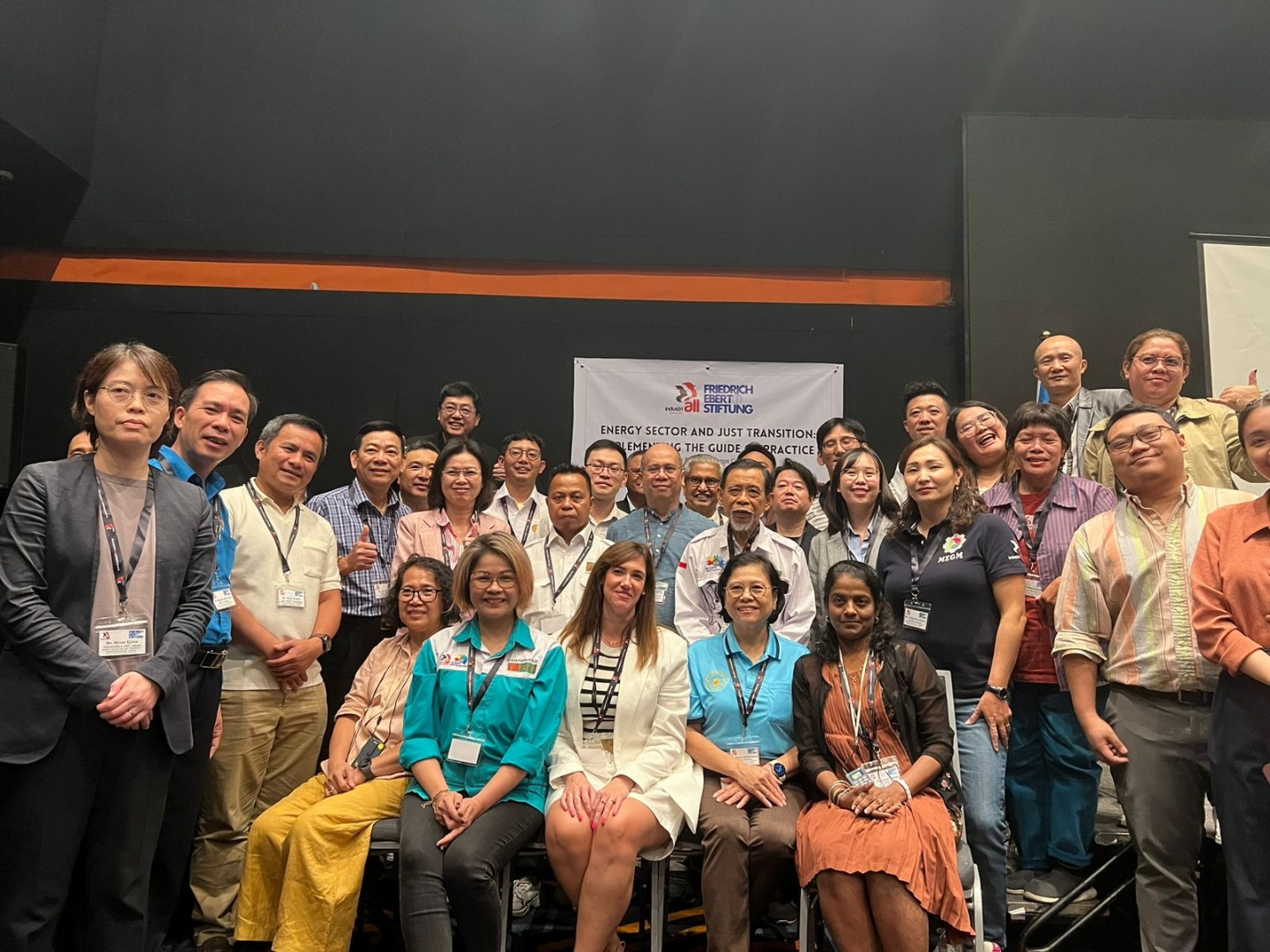25 October, 2024On October 22-23, 2024, IndustriALL, supported by Friedrich-Ebert-Stiftung (FES), hosted a meeting in Manila to discuss the future of energy and Just Transition in Southeast Asia. Delegates from across the region gathered to strategize on prioritizing workers’ rights and job security amid the shift to sustainable energy.
Ramon Certeza, IndustriALL Southeast Asia regional secretary, emphasized the union's demand for active involvement in energy transition policies, stating:
“As countries in Southeast Asia gear towards clean energy transformation in line with the Paris Agreement goals, it is crucial for trade unions to demand a seat at the table to safeguard secure employment, workers' rights, and communities’ wellbeing. No one should be left behind. We demand a Just Transition that puts workers at the heart of this transformation—ensuring decent work, social protection and equality for all, while addressing the pressing need to reduce carbon emissions to protect our planet.”
The gathering marked a significant step towards building strong union alliances to address energy transition challenges. It explored the application of IndustriALL’s ‘Guide of Practice on Just Transition,’ to ensure decent work, social protection and equality while addressing changes in the world of work.
Japan is navigating a complex energy transition as it aims to achieve carbon neutrality by 2050. Despite a declining working population, unions are focused on securing stable employment and facilitating the shift to new energy sources like hydrogen and ammonia.
Collaborating with national center RENGO, Japanese unions are advocating for a comprehensive approach to safeguard job security and improve working conditions. The key challenge remains government engagement and industry stakeholders to address policy gaps and ensure a smooth transition.
Indonesia presented its ambitious energy transition targets under the Just Energy Transition Partnership (JETP) deal, which includes reducing emissions and transitioning from coal.
However, unions highlighted the critical need for worker retraining and social protection, given the projected job losses in coal mining. Unions are advocating for reskilling programs and have successfully formed coalitions to engage with national authorities on climate issues, although their demands are not part of the JETP deal yet.
Thailand reported that while renewable energy initiatives are gaining traction, policy inconsistencies and insufficient coordination pose challenges. Apsorn Krissanasmit, energy sector co-chair, stressed:
“In 10 years, we have faced many challenges in energy and climate. We must be at the forefront, helping the workforce prepare for the future through skilling and reskilling.”
In Singapore, the government has taken proactive measures, including establishing a $100 million fund to support transition projects, but unions are closely monitoring the impact of the rising carbon tax on the petroleum industry and its workers. Notably, Singapore is advancing its shift to electric vehicles and renewable energy production through public-private partnerships and union-approved projects.
The Philippines showcased its advanced engagement in Just Transition, emphasizing social dialogue and collaboration with the department of energy to develop inclusive policies. Local unions have successfully integrated Just Transition provisions into collective bargaining agreements (CBAs), ensuring fair retrenchment policies and training for new job roles.
Additionally, unions are lobbying for a national tripartite Just Transition committee to solidify their role in policymaking.
During the meeting, participants recognized the unique challenges faced by women in the energy sector, particularly Vietnam and Indonesia. Discussions included the need for gender-inclusive policies and training programs to bridge gaps in STEM fields and leadership roles.
Delegates from Mongolia and Taiwan further noted the importance of addressing job displacement risks and enhancing occupational health and safety standards in the energy sector.
Reflecting on unions' critical role IndustriALL director for energy industry and Just Transition, Diana Junquera Curiel, emphasized:
“The work of unions in Southeast Asia is pivotal in shaping a Just Transition that is inclusive and equitable. Through solidarity and strategic engagement, we can protect workers’ rights and ensure a just and sustainable future for all.”
The two-day meeting highlighted unions’ collective strength in advocating for a Just Transition that protects workers’ rights while tackling environmental challenges. Delegates emphasized the need for collaboration and capacity-building to support a fair energy transition.
IndustriALL remains committed to ensuring no worker is left behind as the region moves toward a greener future.










